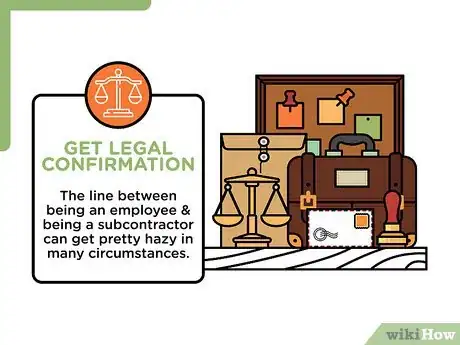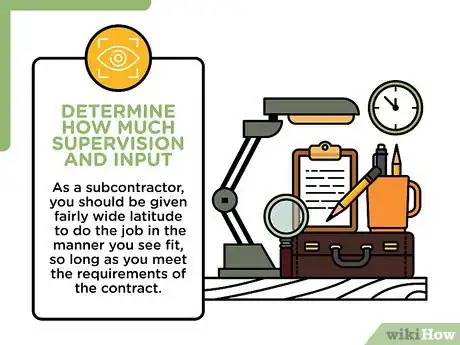This article was co-authored by Ryaan Tuttle and by wikiHow staff writer, Christopher M. Osborne, PhD. Ryaan Tuttle is a Home Improvement Specialist and the CEO of Best Handyman, Inc. in Boston, Massachusetts. With over 17 years of experience, he specializes in building home service businesses, focusing on creating scalable and efficient brands. With the help of his global team, the companies have achieved over 10+ million in sales and received recognition through magazine features, and enjoy partnerships with wikiHow and Jobber field service software. Boston Magazine and LocalBest.com have named Best Handyman Boston the Best Handyman in Boston. Ryaan holds Construction Supervisor and Home Improvement Contractor Licenses.
There are 7 references cited in this article, which can be found at the bottom of the page.
This article has been viewed 180,835 times.
As a subcontractor, you get to be your own boss. While working under contract to a prime contractor, you'll have the power to use your own tools and techniques, and to hire workers to help you as you see fit. However, you'll have to please both the prime contractor (who contracted you) and the client (who contracted the prime contractor). To excel as a subcontractor, whether your field is roofing or coding, you need to develop and market your skills wisely, build strong relationships with prime contractors, and earn a great reputation for your reliability and skills.
Steps
Meeting Practical and Legal Requirements
-
1Develop a specific set of marketable skills. Whether you do plumbing or IT work, a subcontractor is expected to be a trained expert who is fully capable of completing their contracted task. Depending on your field, you might gain this expertise through your education, apprenticeships, and/or employment within the field.
- Prime contractors don’t train or teach subcontractors—they expect them to do the job that they market themselves as being an expert in.
-
2Get properly licensed in your field, if necessary. If you work in a field that requires a government license—as is often the case in the building trades—you’ll need to be properly licensed to legally work as a subcontractor. Contact the relevant government agencies in your area for specific information on getting licensed.[1] [2]
- If you are employed by a prime contractor, you may not need to be licensed, since you are covered under their license. However, as a subcontractor, you work independently and therefore may need to be licensed separately.
Advertisement -
3Seek field-specific advice from current and former subcontractors. As you gain the training and experience required to become a successful subcontractor, take note of the specifics of how subcontracting functions in your field. The more common subcontracting is in your field, the more likely it is that you can become a successful subcontractor.
- Talk to current subcontractors, or prime contractors or employees who used to be subcontractors, about their experiences in the role.
- If relevant, ask about the pros and cons of working as an employee (which means more direct control over your work by your employer) versus as a subcontractor (which means you're contracted to complete a specific task without being directly controlled).
- Subcontracting is very common in the building trades, as well as fields connected to the fulfillment of government contracts.
-
4Examine the tax and legal implications for your work status. The freedom of being a subcontractor comes with a lot of responsibility. As a subcontractor, you are responsible for setting up your business, determining your tax status and paying your taxes, getting required and recommended insurance coverage, and so on. The particular requirements will vary widely based on your field and where you live and work.[3]
- You may, for instance, have to determine the pros and cons of working as a sole proprietor/practitioner versus setting up a business entity (such as an LLC in the U.S.).[4]
- Consider consulting with an attorney, and possibly also an accountant, who is versed in legal and taxation issues within your field.
-
5Build up sufficient funds to support your enterprise. It definitely takes money to make money as a subcontractor. You need to invest in any tools and equipment you need, pay for insurance, pay for employees you might hire, spend on marketing yourself and/or your company, and so on. Therefore, you may need to work as an employee in your field before you can afford to become a subcontractor.[5]
- Generally speaking, an employer must provide an employee with the tools required to do the job; a prime contractor can expect a subcontractor to provide their own tools to do the job.[6]
- Small business loans or grants may be available for your subcontracting enterprise. Make sure you consider all the details before agreeing to a loan or grant, however.
Finding Prime Contractors
-
1Market yourself professionally, highlighting your clearly-defined skills. Whether presenting yourself as an individual or a business seeking subcontracting work, make sure you do so in a professional manner. Make business cards that you can hand out to potential clients. Type up an introductory letter that highlights your skills, or go a step further and make a pamphlet or brochure.[7]
- Create a business website that’s professional and easy to navigate.
-
2Network at trade shows or conferences in your field. Subcontractors succeed through good word-of-mouth and building positive professional relationships with others in the field. This means getting your name out there and establishing connections with prime contractors and those looking to offer contracts.[8]
- Expos and trade shows are great places to meet and mingle with others in your field, especially in the building trades. In other lines of work, professional or academic conferences might also fit the bill.
- Hand out your business cards and brochures, and direct people to your website.
- Work on your “elevator pitch”—a roughly 60-second introduction that sums up your abilities and enthusiasm.
-
3Utilize websites or organizations that connect subcontractors with prime contractors. Fields that make heavy use of contractors and subcontractors usually have online job boards that can help connect you with prime contractors. Government agencies that use contractors and subcontractors, for instance, often provide such job boards.[9] [10]
- Use job boards in conjunction with the personal connections you make through networking and doing work in your local area. Cast a wide net when seeking prime contractors, then narrow your focus to the best options.
-
4Do your homework on potential prime contractors. Study the websites of potential prime contractors, and look for online reviews from customers and other subcontractors who’ve worked with them. It’s vital that you find a prime contractor who is reliable, trustworthy, and easy to work with.[11]
- You want to do a lot of the same type of work as someone who’s looking to hire a contractor. Check that they are properly licensed, have the necessary insurance, and have done good work in the past.
Making and Fulfilling Contracts
-
1Get legal confirmation that you're a subcontractor, if necessary. The line between being an employee and being a subcontractor can get pretty hazy in many circumstances. The sticking points tend to be the amount of control the prime contractor/employer asserts over how you do the work. If needed, consult an attorney for clarification, or contact a taxing body such as the IRS in the U.S.[12]
- According to the IRS, for instance, the criteria for drawing the line between an employee and a subcontractor rests on 3 components: the amount of behavioral control the prime contractor/employer asserts (that is, how the work is done); the amount of financial control you have over the work you do; and the way in which the parties view the relationship (as per their contract and actual interactions).
- If you are determined to be an employee, you’ll likely be eligible for benefits and workplace protections, but also be subject to tax withholding and greater control by your employer.
-
2Establish clearly how and when you will be paid. As a subcontractor, you’ll receive payment from the prime contractor, who in turn receives payment from the client. Make sure it is clearly stated in your contract when you’ll be paid in relation to when the prime contractor is paid by the client. Otherwise, you might be stuck in limbo waiting to be paid for work you’ve already done.[13]
- For instance, if the prime contractor’s contract with the client states that they will be paid within 14 days of the completion of the job, your contract might state that you’ll be paid within 7 days of the prime contractor receiving payment.
- If possible, negotiate a contract that stipulates that you’ll be paid within a certain time frame (e.g., within 7 days of completing your part of the job) regardless of when or if the client pays the prime contractor.
-
3Determine how much supervision and input the prime contractor wants. As a subcontractor, you should be given fairly wide latitude to do the job in the manner you see fit, so long as you meet the requirements of the contract. That said, some prime contractors take a more hands-on approach than others, so you should clearly discuss this beforehand—and, if possible, clarify it in your contract.[14]
- If you’re under contract to build a website or wire a home, you may not want the prime contractor looking over your shoulder all the time. However, it is perfectly reasonable for them to keep tabs on you and make sure you’re doing the work according to schedule and quality level your contract states.
-
4Build a great word-of-mouth reputation by excelling at your work. To make a living as a subcontractor, you need to be able to move from one job to the next without long gaps in between. The best way to guarantee steady work is to earn a great reputation for your reliability and skills. If you do this, you may end up becoming a “go-to” subcontractor for a specific prime contractor and be offered as much work as you want.[15]
- If you ever decide to transition from being a subcontractor to becoming a prime contractor, having an excellent reputation in the field will serve you well in building your own client base.
Expert Q&A
-
QuestionHow can subcontractors get work?
 Ryaan TuttleRyaan Tuttle is a Home Improvement Specialist and the CEO of Best Handyman, Inc. in Boston, Massachusetts. With over 17 years of experience, he specializes in building home service businesses, focusing on creating scalable and efficient brands. With the help of his global team, the companies have achieved over 10+ million in sales and received recognition through magazine features, and enjoy partnerships with wikiHow and Jobber field service software. Boston Magazine and LocalBest.com have named Best Handyman Boston the Best Handyman in Boston. Ryaan holds Construction Supervisor and Home Improvement Contractor Licenses.
Ryaan TuttleRyaan Tuttle is a Home Improvement Specialist and the CEO of Best Handyman, Inc. in Boston, Massachusetts. With over 17 years of experience, he specializes in building home service businesses, focusing on creating scalable and efficient brands. With the help of his global team, the companies have achieved over 10+ million in sales and received recognition through magazine features, and enjoy partnerships with wikiHow and Jobber field service software. Boston Magazine and LocalBest.com have named Best Handyman Boston the Best Handyman in Boston. Ryaan holds Construction Supervisor and Home Improvement Contractor Licenses.
Home Improvement Specialist Reach out to a general contractor and see if you can make any connections or relationships. Also, try signing up with a local union or association, which can also help you network.
Reach out to a general contractor and see if you can make any connections or relationships. Also, try signing up with a local union or association, which can also help you network. -
QuestionHow do I put myself in a database so employers can find me and hire me as a subcontractor?
 Community AnswerVisit job websites, and upload your resume to their database.
Community AnswerVisit job websites, and upload your resume to their database. -
QuestionIf I have my own security guard company and want to ask other companies if they are looking for someone to subcontract, where do I start?
 Community AnswerContact the companies directly and ask to be given the opportunity to bid for any upcoming jobs by getting added to their vendors list. Price your bid low so you have a chance to work for them and prove your company's worth.
Community AnswerContact the companies directly and ask to be given the opportunity to bid for any upcoming jobs by getting added to their vendors list. Price your bid low so you have a chance to work for them and prove your company's worth.
Warnings
- Subcontract agreements must contain a complete scope of the work, an itemized list of materials you must supply and specifications for them, and a detailed schedule of when phases of the work must be completed.⧼thumbs_response⧽
References
- ↑ Ryaan Tuttle. Home Improvement Specialist. Expert Interview. 18 June 2021.
- ↑ https://careertrend.com/how-4812608-become-a-subcontractor.html
- ↑ https://www.gov.uk/what-you-must-do-as-a-cis-subcontractor
- ↑ https://www.traderisk.com.au/becoming-a-subcontractor
- ↑ https://www.techrepublic.com/article/tips-for-success-as-a-subcontractor/
- ↑ https://www.irs.gov/pub/irs-regs/subcontractorsfaq&a.prn.pdf
- ↑ https://careertrend.com/how-4812608-become-a-subcontractor.html
- ↑ Ryaan Tuttle. Home Improvement Specialist. Expert Interview. 18 June 2021.
- ↑ Ryaan Tuttle. Home Improvement Specialist. Expert Interview. 18 June 2021.
- ↑ https://www.nycedc.com/opportunities/subcontractors-and-suppliers
- ↑ https://www.techrepublic.com/article/tips-for-success-as-a-subcontractor/
- ↑ https://www.irs.gov/pub/irs-regs/subcontractorsfaq&a.prn.pdf
- ↑ https://www.techrepublic.com/article/tips-for-success-as-a-subcontractor/
- ↑ https://www.techrepublic.com/article/tips-for-success-as-a-subcontractor/
- ↑ https://careertrend.com/how-4812608-become-a-subcontractor.html














-Step-9.webp)




















-Step-9.webp)






































